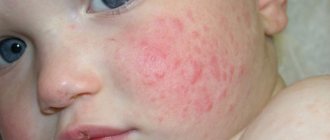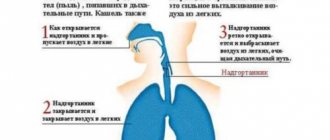Photo from magforwomen.com
The child was always white and fluffy, but suddenly he turned bad. He was sweet and friendly, but he became angry and hysterical. I was almost an excellent student, but slipped into twos and threes. He was so positive, but he became a whiner. It seems that the dwarves came, took away a good child, and brought back some nasty changeling.
For a long time, it was believed that children did not experience any depression at all—that only a mature personality could respond to difficult life circumstances with depression. Then doctors found out that depression also occurs in children, but is different from depression in adults.
Childhood depression is not easy to recognize and diagnose because it hides behind other, more pronounced problems - depending on the age of the child. The younger the child, the more difficult it is to recognize depression behind whining, complaints of “stomach hurts” and “legs hurt.”
The child eats poorly, sleeps poorly, and cries. In older preschoolers, fears, restlessness, anxiety, and sometimes aggression come to the fore. Among schoolchildren, the most noticeable problems are poor academic performance, reluctance to learn, short temper and quarrelsomeness.
Adults are most often unable to understand what is happening to the child. He seems to them either sick or capricious. They explain his condition by laziness, rudeness, and promiscuity. Parents think that the child has become insolent and grab the belt when they should be holding the head. Some families only reach specialists when the child begins to talk about suicide.
Photo from generationnext.com.au
Where does it come from?
Childhood is considered to be a happy and carefree time, and children's problems seem trivial and easily overcome to adults. But children, just like adults, experience stress and grief - but, unlike adults, they do not yet have either life experience or the ability to cope with them.
Childhood depression, just like adult depression, does not have a single cause. Scientists identify several different premises.
Firstly, these are biological factors (including congenital disturbances of the neurobiochemical balance in brain synapses, changes in certain brain structures, disturbances of biological rhythms, etc.)
Secondly, there are genetic factors (hereditary predisposition - relatives of children diagnosed with depression often have depression, bipolar disorder or other mental illnesses).
Thirdly, psychosocial prerequisites: first of all, mental trauma. In infants – separation from the mother (hospital, sanatorium, shelter, orphanage); for children over 4 years old - scandals in the family, divorce of parents, death of loved ones and the birth of brothers or sisters; for schoolchildren - school; for everyone - disasters, wars, difficult socio-economic changes. The cause of depression can be a serious illness or an age crisis.
Some scientists indicate that one of the prerequisites for the appearance of depression is personal characteristics and ways of responding to stress: some children easily adapt to a difficult situation, while others find it unbearable.
Photo from youthensnews.com
How to treat childhood depression?
The treatment regimen is selected by the psychotherapist depending on the age and condition of the child. For mild depression, regular psychotherapy sessions are sufficient. But for more severe forms of the disorder, antidepressants are prescribed. Doctors usually combine drug treatment with psychotherapeutic techniques.
Children are prescribed serotonin reuptake inhibitors - they affect the absorption of neurotransmitters and make serotonin molecules (the “happy hormone”) last longer.
What does it look like
Clinical criteria for major depression (or unipolar, as opposed to bipolar disorder with alternating manic and depressive stages), according to the diagnostic and statistical manual, include depressed mood (feeling of emptiness, tearfulness, in children and adolescents - increased emotional excitability); decreased interest and pleasure in all areas of life; changes in weight and appetite; insomnia, drowsiness; agitation or lethargy; weakness and loss of energy; feelings of failure and unreasonable guilt; inability to think and concentrate; thoughts of death, suicidal thoughts.
American psychiatrists warn: depressed children, especially if they are over 12 years old, may start using alcohol and drugs.
Depressed children often complain that everything hurts – their head, stomach, heart, arms, legs. Some have everything at once, some have only one thing, but always. Some say it is difficult to breathe, impossible to breathe. They begin to get sick a lot, and very often before contacting a psychologist or psychiatrist, they are examined by different doctors for several months.
Many “fall into childhood” - in fact, they return to previous stages of development: they lose mastered skills, begin to play with long-abandoned toys, and return to once-loved books for little ones. Enuresis and encopresis may occur. Some begin to pretend to be babies: lisp, ask to be held, and offer to play children's games.
Tearfulness, fears, whining, stickiness and importunity - on the one hand, children are irritated and rude to adults, on the other hand, they want confirmation of love from them - these are also signs of depression. “Children, like adults, may have a pronounced circadian rhythm of endogenous depression: in the morning they are lethargic and boring, and in the evening the level of anxiety and irritability increases, and motor control increases,” says clinical psychologist Natalya Naumenko.
Photo from cognitive-psychiatry.com
Children often think about the meaninglessness of life, about death. Someone is afraid for themselves and is looking for all possible sores, someone for their mother: will she get hit by a car, will she die? Some are terrorists, thieves, robbers. Someone is worried about the fate of the world: whether there will be a war, whether they will bomb us, whether humanity will die from overpopulation or a cosmic catastrophe.
The most insignificant reason can cause wild hysteria. Domestic psychiatrists N. Iovchuk and A. Severny describe attacks of excitement with crying, uncontrollable movement, screaming, tears: “At the same time, children’s complaints are limited to the laconic: “I can’t do this anymore,” “there is water and fire in my chest,” accompanied by the same type of lamentations or screams ”, these authors write.
“At the moment of uncontrollable movement, children smash dishes, break toys, tear clothes, jump out onto the balcony, into the yard and defiantly scream shrilly, roll on the floor, even chew chair legs. At the same time, they shout that they can’t live anymore, that they won’t live, that it’s better to die, and often they attempt to commit suicide. Such states last from 10-15 minutes to 2 hours and are replaced by motor retardation with silence and low availability.
Equally short-lived are states with painful bodily sensations and fear of death, occurring with motor restlessness, and less often with immobility.”
Experts always urge that any promises to commit suicide be taken with the utmost seriousness.
For some reason, there is a myth that a person who says he will commit suicide is only scaring and will never do it. Another problem with children is that they often do not have a sense of the line between a real suicide attempt and a make-believe attempt, there is no clear understanding of the irreparability of their actions - this appears only in adolescence.
Photo from huffingtonpost.co.uk
It seems to the child that he will be able to watch from somewhere from the outside how they mourn him, how everyone repents that they were unfair to him... This is exactly the case when it is better to play it safe.
Signs of suicidal behavior in children:
(From the article Depression in Children)
- Numerous symptoms of depression (changes in appetite, sleep, activity).
- Social isolation, including family isolation.
- Talk about suicide, hopelessness and helplessness.
- Aggression or unwanted behavior (including sexual behavior).
- Increased risk appetite.
- Frequent accidents.
- Alcohol and drug use.
- Fixation on death and negative topics.
- Conversations about death and dying.
- Inability to cry or decreased emotionality.
- Giving away your things.
What then?
A depressive episode in a child without treatment lasts on average 9 months. This is the duration of an entire academic year. Children usually fall sharply behind their peers academically and drop out of social life. In fact, they lose an entire year of life.
Depression often returns. A study published in The Journal of the American Medical Association shows that adults who experience depression during adolescence earn less than their healthy peers, are less likely to obtain a college education, are more likely to be unemployed, and experience more problems at work, social and family life. life. They suffer from depression twice as often as adults who have not previously had such problems. 7% of them commit suicide, 34% attempt it (0% among those who did not suffer from depression in their youth).
Photo from vitamindcouncil.org
Which doctor treats childhood depression?
If you suspect your child is suffering from depression, make an appointment with a psychiatrist or psychotherapist. It is important that the doctor has a medical education and experience working with children.
To date, there is no standard diagnostic system that can accurately determine whether a child has depression or not. Therefore, assessment of children's condition often requires several visits to a specialist and an in-depth examination by a clinical psychologist specializing in psychopathology.
The assessment of the psycho-emotional state is based on:
- conversations with the child;
- collected family history;
- studying the family situation;
- communication with parents.
Information from friends, teachers, distant relatives - all people who often come into contact with the child can also help.
Moms tell
Here are some stories from life (names of mothers and children have been changed). In all cases, the diagnosis of depression was made by a doctor.
Elizaveta, Yegor’s mother: “It all started in the fifth grade. He seemed to be having difficulty coping with the new demands of school. He said that he didn’t want to go to school, that he wouldn’t go, that his stomach hurt. He vomited several times before school. Then he began to say that his legs could not walk. In general, it began to seem to me that this was a strange, unfamiliar child: mine never slammed doors or screamed hysterically. Conversations with him turned into walking through a minefield: you never know what he will react to and where he will explode. He began to have difficulty falling asleep at night, cried, shouted that he would not get enough sleep, that he would not be able to go to school in the morning, and as a result he stopped sleeping completely. He had a headache all the time and began to have severe migraines.
I almost stopped studying - I got two and three grades in all subjects, one notebook for all my lessons, I didn’t do my homework, after school I hung out with my friends in other people’s yards. Friends said - maybe he had started adolescence? But what is the teenage age of a little ten year old?
Then it became completely scary: he started talking about the meaninglessness of life, about the fact that he didn’t want to live, that everything around him was just a dream...
He did nothing, sat at home and played with his cars, which he loved to play with when he was two years old. He refused to wash, get his hair cut, brush his teeth, comb his hair, or change his clothes. He complained that he could not read - the letters did not form words, did not understand the meaning of what he read, could not solve the problem because he did not understand what it was about. It was only then that I realized what was wrong with him - and ran with him to the doctor.”
Tatyana, Anton’s mother: “Two of Anton’s classmates bullied him right during breaks in the corridor, under the teacher’s nose, humiliated him. And at that time he also had an exacerbation of bronchial asthma. The result is a complete loss of working capacity, loss of all school skills, severe fatigue, drowsiness and, at the same time, very poor sleep; noticeable decrease in self-esteem, fears, wrote several times at night.
The exacerbation of asthma could not be stopped for a long time, an infection developed, resulting in pneumonia. I assumed depression and went with him to a clinical psychologist and neurologist. The first took him to classes, the second prescribed treatment. It helped, he was released, but then he recovered for more than two years, and to this day it all echoes with self-doubt.”
Galina, Seryozha’s mother: “It all started in the fourth grade, in the fall. Children with communication difficulties are probably prone to this in principle.
In conversations before going to bed, he began to express fears for his life and especially for mine. There was a global fear of death. He cried. A teacher at school noticed a sharp decline in academic performance and worsening behavior.
Something had to be done to help the child. The doctor found out everything. The treatment helped quickly, and that was the end of it. Perhaps because, as the doctor said, we caught depression at the very beginning stage.”
Marina, German’s mother: “My son turned 13, he went to seventh grade. Almost simultaneously, the father left the family and the grandmother, whom the son loved very much, died. The son was lying on the sofa hugging the cat and doing nothing. He built houses from pillows and blankets. Lost appetite. Dizziness and lightheadedness appeared.
My son started leaving school after two or three lessons. I didn’t study my lessons at all, and I explained this by laziness, lack of willpower: “I want, I will, I’m going to - but tomorrow, today I can’t.” Then I became seriously ill. While I was in the hospital, my son lived with relatives, refused to wash or brush his teeth, skipped school, lay in bed, and cut off all social contacts. Treatment was prescribed, but it did not help much, although sleep and appetite were restored. The whole school year is gone. Now he is studying at home, teachers come, but he cannot study his unloved subjects for more than 40 minutes, he immediately gets headaches and lightheadedness.”
Photo from indianexpress.com
School as a reason
After the age of seven, school becomes the main cause of childhood depression. The most typical problems are difficult adjustment to the first and fifth grades, problems in relationships with classmates, school bullying and unprofessional behavior of the teacher.
Iovchuk and Severny in the article “On the problem of didactogenic disorders in schoolchildren,” published in 2007, write: “In the last 10 years, among the children we have observed, there has been a steady increase in severe and prolonged depressive conditions, definitely associated with schooling, namely with the inadequacy of educational measures, unfair attitude of the teacher, including underestimation of grades, the use of “neuroticizing” tests (primarily the reading speed test), psychological and physical violence.”
The teacher may not humiliate the student personally: the child watches how the teacher communicates with the class and is afraid of public humiliation. The child begins to get sick, complains of stomach pain, nausea, he vomits before school, he refuses to go there under all possible pretexts... Fears worsen, cognitive impairments appear (children have difficulty concentrating, it’s hard for them to think, they complain about their own dullness), studying becomes difficult. impossible...
The hardest thing is the reaction of parents to children's problems. Parents require their child to study well. Parents work with him additionally, increase control, deprive the child of pleasure - and all this increases depression.
On one parental Internet resource, one mother complained: “I have already deprived him of a computer, TV and walks, the New Year was canceled, and he didn’t deserve a birthday present either. I started using VKontakte from my phone, and I took my phone too. Now he lies on the couch all day and still does nothing. How else can I punish him?
Sometimes parents resort to physical punishment; The consequences for a depressed child can be dire.
Iovchuk and Severny write: “In correctional work, the participation of parents is extremely important, who, as a rule, do not understand the nature and depth of the child’s mental disorders, at first refuse to accept psychiatric, especially psychopharmacological therapy, and tend to accuse the child of “simulating”, laziness, hooliganism, etc. .P.
If parents behave incorrectly, depression becomes even more protracted and leads to deep school disadaptation (incomplete school, the need to transfer to an external school, an individual education school for children with poor health and disabled children). However, with persistent psychotherapeutic work with parents, it is most often possible to involve them in the psychocorrectional process in the interests of the sick child. Which, unfortunately, can almost never be said about teachers.”
Causes of childhood depression
Psychiatrists identify several key factors that provoke depression in childhood and adolescence. The most common triggers are:
- physical violence;
- school bullying;
- mockery and devaluation from parents, teachers, and surroundings.
It is important to understand that not only physical, but also psychological violence causes irreparable harm to the psycho-emotional health of children. Psychological violence includes a ban on expressing emotions, ignoring children's needs and feelings. Even if the family atmosphere is favorable, a child may be subjected to psychological violence at school, from “friends” or from a crush.
It provokes depression among children and domestic violence committed against one of the parents. WHO statistics are disappointing: almost a third of women who enter into partnerships experience violence.
For children, such situations are dangerous because their needs are completely ignored by both parents, they do not receive help, and they experience constant fear. This situation is called “collateral damage.”
The feelings experienced by a child are similar to those of a victim of domestic violence. Moreover, children often feel guilty for their parents’ problems and this aggravates their psycho-emotional state.
Among other factors that provoke childhood depression, doctors name:
- family history of mental illness;
- chronic diseases: for example, diabetes;
- tendency to “get hung up” on problems;
- excessive emotional excitability;
- adverse life events (death of a relative or friend, parental divorce, loss of friends);
- mental disorders: for example, attention deficit disorder, in which a child has difficulty concentrating on one thing for a long time, or obsessive-compulsive disorder, characterized by obsessive thoughts or behavior.
Treat adults better!
When I shared the above-cited article on social networks, it caused a storm of indignation among readers: this is not a child, these are adults who need to be treated!
In fact, teacher harshness, often turning into cruelty, and parental perfectionism combined with anxiety, high demands placed on the child, and a tense environment at home are the very factors that cause depression. It really seems like: normalize the situation at school and in the family - and you don’t need any pills.
Photo from mental.healthguru.com
Almost all children and adolescents experience some symptoms of depression, and up to 5% of children and 10-20% of adolescents may experience serious depression,” write American psychiatrists Mash and Wolf. What is this – to treat everyone?
No: in some cases, normalization of the situation is really sufficient. But some children may need both work with a therapist and treatment. How do you understand when you need a doctor and when you can get by with the help of a psychologist?
“It is imperative to consult a doctor in cases where a child experiences not only changes in mood, worries, random complaints about well-being, but also real somatic problems: sleep disturbances, appetite, weight fluctuations, when he complains of pain in the arms and legs , stomach,” says clinical psychologist Natalya Naumenko. – Enuresis and encopresis also indicate neurotization on an organic background, and with this you also need to go to the doctor.
Sudden changes in behavior should be alarming: when a child becomes irritable, aggressive, or when he develops fears.
Unfortunately, childhood depression is poorly diagnosed, and even if parents suspect a problem, the doctor may not confirm their suspicions. Sometimes just normalizing the situation is enough.
Here is a case from my practice: a wonderful, gifted four-and-a-half-year-old boy was brought in with complaints of hysterics and irritability. While I was testing the child, his answers always contained the motive “mom will scold”, “the boy is afraid that his mother will scold him”... It turned out that the boy had recently had a sister, and the father abandoned his mother with the newborn in his arms. All of his mother's irritation went to the boy - his mother read morals to him, like an adult. In addition, over the past year, his beloved and loving grandmother died, and a teacher appeared in kindergarten who beat him, which he did not tell his mother.
When mom realized what was happening, she was very scared. She is going through a very difficult period in her life, but she loves the child - and I am sure that in this case the normalization of the situation is quite enough, and in two or three months the child will return to normal. But if this does not happen, this is a reason to see a doctor.”
“Everyone told me – I’m crazy, the baby is on pills! Tablets are harmful! – says Elizaveta, Yegor’s mother. -But I turned to a psychologist who said: everything is fine with your relationships, you should see a neurologist and a psychiatrist. For six months I tried to solve the problem with love and care, but my son was getting worse. The child forgot how to read, stopped sleeping, began to argue that not living is better than living...
Pills are harmful, yes. But not living is more harmful.
After four months of treatment, the former cheerful boy returned. But we had to help him with his studies for another two years - everything was so neglected.”
“I created a therapeutic and protective regime for Anton at home,” says Tatyana. – Calm environment, completely removed the TV and computer, baths, walks (when asthma and pneumonia became better). I didn’t start studying so as not to get out of the rhythm of life, but we studied on my knees, wrote hand in hand, read to him myself, talked a lot about different topics in general.
The most difficult thing for him was going to school after sick leave, he was desperately afraid. And for me the most difficult thing was not to lose my temper when communicating with the school, and not to strangle the teacher: the rage simply burned me out. It was this rage that helped get the administration to force the teacher to help the child and not drown him.
The parents in the class helped a lot, encouraging the children to help their son. The school psychologist also helped a lot; she worked with the class, separately with the instigators of bullying. The culprits brought him a public apology in the end. The teacher quit at the end of the year. But there are still echoes of the problems now, although three years have passed – mainly a decrease in self-esteem.”
Life is more important than school. This is probably the main thing that parents tormented by responsibility, guilt and school should remember.
Photo from elblogdecynthia.com











